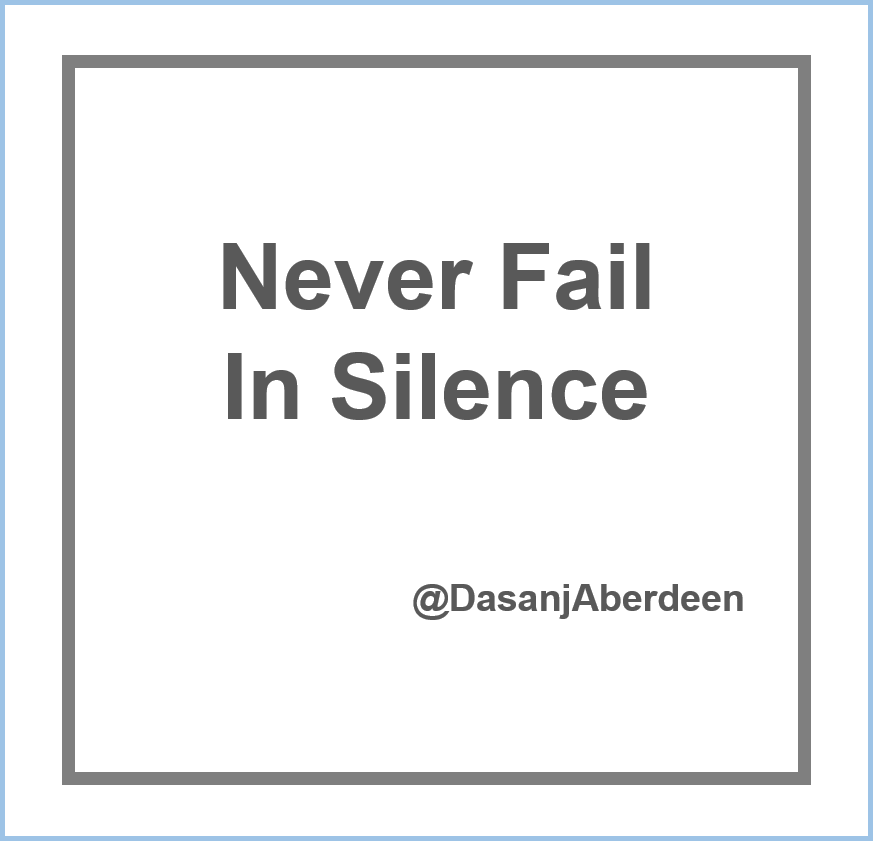Society teaches us how to succeed. We hear countless success stories with “how to” insights to replicate these results. We know those who “made it” by name. Success is associated with pride, respect and power. Meanwhile, society provides less guidance on failure which is associated with shame, rejection and not being good enough. As a result, when we fail, we remove ourselves from the spotlight, go into hiding and take our stories with us. We fail silently.
We don’t speak about or acknowledge our failure during the process. We feel oppressed by shame, judgement and our circumstance. By not facing failure directly, we give it the power to hold us hostage.
I’ve experienced this and was confined by my feeling of failure. I couldn’t find it in me to share what was going on.
I remember friends and family encouraging me to share, pointing out that we all go through situations and I didn’t have to figure everything out alone. The invitation was extended but I didn’t have it in me to share at the time.
It wasn’t until after I got through and over everything that I gained clarity.
I noticed the opportunity you have while dealing with failure. When you can rise above what is going on and decide to not be confined by your situation, you become empowered. You gain strength and confidence to take actions that influence your outcome. You no longer have to stay where you are or in your current circumstance. Failure no longer has to define you or immobilize you.
There needs to be more attention to what I call “failing presently and actively.” By this, I mean being present to a failure while it is happening and actively addressing it to gain control of your perspective and influence the outcome. This means not being paralyzed by shame or fear and welcoming the opportunity to be vulnerable and authentic. Here are some specific ways you can do this:
There needs to be more attention to what I call “failing presently and actively.” By this, I mean being present to a failure while it is happening and actively addressing it to gain control of your perspective and influence the outcome.
Get introspective. It is OK to look within and understand what is going on. Self-awareness is important and slowing things down to put the pieces together can help you get there. However, don’t let this be your only way of handling your failure. Overthinking can lead to doubt, blame and halt your progress toward a solution. Challenge old mindsets such as the need for perfection and don’t be a victim of paralysis by analysis.
Forgive yourself. This will give you your power back. It is easy to look at yourself when something goes wrong, but having someone to blame doesn’t change the situation. It is especially paralyzing if you begin to see yourself and your situation as one. You are not your mistakes or failures. Let yourself be free to identify the lessons and prepare to apply them forward.
Voice it. Speaking about a failure is one of the hardest things to do in the moment. You get embarrassed about your circumstance and reality, associate the failure with your worth, feel less than and worry about how others will perceive you. You walk around with a secret that you’re afraid others will find out about. However, expressing what is going on is helpful. It lifts the weight you carry around. And it gives you the opportunity to speak about the situation as opposed to the meaning you associate with the situation.
Share your story. By sharing what is going on with you, you inspire others. You never know who may be going through the same thing, in silence. When you break your silence, you encourage others and provide hope. You show that you don’t have to remain ashamed or be defined by what happens to you. You can continue to live freely and authentically.
Connect with others. Going through the ups and downs in life are fundamentally human. We all have these stories. When you highlight times that were challenging for you, you create opportunities to connect with others. Life isn’t only about the shiny highlights. You can gain strength and support from the lessons and perspectives of others. This has benefited me personally when I’ve shared experiences with friends, colleagues, strangers, and mentors who then shared their similar story. It automatically created a bond and deepened our relationship!
Embrace the opportunity to grow. Don’t be afraid to grow. If you are a high achiever, getting anything short of an A+ is difficult. But life is full of changes so the best thing you can do is get comfortable with imperfection and pivots. Use failure as a learning opportunity and a chance to grow. If failure is expected, you’ll benefit if you can learn and course-correct quickly to catapult to better results.
******************************
How about you? How do you handle failure? Is it something you find challenging? Do you address it head on? I’d love to hear your perspective below!
Dasanj Aberdeen is an entrepreneurial spirit who embodies the combination of left-brain logic and right-brain creativity. She is a consultant and proponent of multidisciplinary education, approaches and pursuits. She writes about their benefits in modern times and integrating multiple interests into a sustainable and fulfilling lifestyle. She’s a graduate of The Wharton School of the University of Pennsylvania and Temple University with a concentration in Technology & Innovation Management, jointly delivered by the Fox School of Business and College of Engineering.


